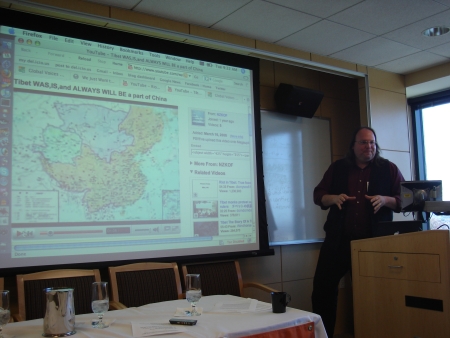ICT & Public Diplomacy at Fletcher: Ethan Zuckerman
April 15th, 2008 — marycjoyce
Today I am at the Fletcher School of Diplomacy at Tufts University to attend a panel organized by I&D research assistant (and Fletcher student) Josh Goldstein and chaired by Berkman fellow and Global Voices co-founder Ethan Zuckerman. The panel, entitled “ICT and Public Diplomacy” is part of a larger conference, the Edward R. Murrow 100th Anniversary Conference on public diplomacy. I took notes on all the panelists’ presentations but as I still need to edit the other sections, I’ll start with Ethan’s.
Ethan begins with an introduction to the Internet. There has been a fundamental shift in recent years. The ability to broadcast online, which was previously only accessible to physics professors connected to CERN, is now available to anyone. This greater access also applies to cell phones. In a recent study conducted by the London School of Economics, 79% of rural Tanzanians said they had access to a mobile phone if they needed one. (This potential access tends to realize itself at moments of political crisis.)
Mobile phones are part of a participatory broadcasting network. Ethan avers that Robert Mugabe has been unable to rig the election in Zimbabwe because mobile phones (and community radio) are the most effective forms of election monitoring. In Ghana, for example, people called community radio stations with news that voters were being prevented from voting at certain polling stations.
The Internet and mobile phones allow people to participate in politics. We have previously viewed diplomacy as being government-to-government and public diplomacy as being government-to-people. Public diplomacy has by and large been carried out by traditional broadcast media. “The trick nowadays in that everyone is a broadcaster,” says Ethan. They can work with you or against you.
Ethan moves on to an example from China (see image above). There were recently protests in Tibet, some of which turned violent. Editors at Ethan’s organization, Global Voices, read, filter, and contextualize blog content in China and other countries. Part of the content they have been covering recently are digital efforts by Chinese citizens to oppose the Western media coverage of the protests. We Just Want the Truth is a web site created by bloggers critiquing international media coverage of the protests.
There are also YouTube videos. Ethan shows a video, Riot in Tibet: True Face of Western Media, (dionysos615) which shows factual errors made by the western media, including photos of police from Khatmandu, Nepal, being mislabeled as being from Lhasa, Tibet. The the video, which has text in English, is meant to persuade the West that their media is biased, not inform a Chinese audience. Another video in English, Tibet WAS,IS,and ALWAYS WILL BE a part of China, a historical polemic about why Tibet is part of China, has been viewed over 2.5 million times. Ethan suggests that it is actually nationalistic and digitally-literate young Chinese that are a critical part of this campaign, rather than some government conspiracy to oppose the Tibetan independence.




 Click Here
Click Here